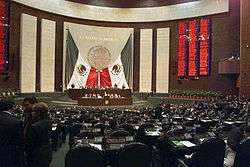Congress of the Union
| Congress of the Union Congreso de la Unión | |
|---|---|
| LXIII Legislature | |
.svg.png) | |
| Type | |
| Type | |
| Houses |
Senate Chamber of Deputies |
| History | |
| Founded | September 28, 1821 |
| Leadership | |
President of the Senate | |
President of the Chamber of Deputies | |
| Structure | |
| Seats |
628 (128 Senators) (500 Deputies) |
 | |
Senate political groups | |
 | |
Chamber of Deputies political groups | |
| Authority |
Title III, Chapter II of the Political Constitution of the United Mexican States |
| Salary |
$500,000 pesos (Senator)[1][2] $150,139 pesos (Deputy)[3][4] |
| Elections | |
Senate last election | July 1, 2012 |
Chamber of Deputies last election | July 1, 2012 |
Senate next election | 3 June 2018 |
| Motto | |
|
La Patria Es Primero (The Country Is First) | |
| Meeting place | |
 | |
|
Senate Palacio del Senado Mexico City | |
 | |
|
Deputies Palacio Legislativo de San Lázaro Mexico City | |
| Website | |
|
Senate Website Chamber of Deputies Website | |
| Constitution | |
| Mexican Constitution of 1917 | |
The Congress of the Union (formally Congreso General de los Estados Unidos Mexicanos; English: General Congress of the United Mexican States) is the legislative branch of the Mexican government.
Structure
The Congress is a bicameral assembly, consisting of two chambers: the Chamber of Deputies, and the Senate of the Republic. Its structure and responsibilities are defined in the Third Title, Second Chapter, Articles 50 to 79 of the 1917 Constitution.
The upper chamber is the Senate, "Cámara de Senadores" or "Senado". It comprises 128 seats, 96 members are elected by direct popular vote for six-year terms; the other 32 seats are allocated based on proportional representation.
The lower house is the Chamber of Deputies, "Cámara de Diputados". It has 500 seats, 300 members are elected by popular vote to three-year terms; the other 200 seats are allocated according to proportional representation.
Elections
The Congress of the Union (Congreso de la Unión) has two chambers. The Chamber of Deputies (Cámara de Diputados) has 500 members, elected for a three-year term, 300 of whom are elected in single-seat constituencies by plurality, with the remaining 200 members elected by proportional representation in 5 multi-state, 40-seat constituencies.[5] The 200 PR-seats are distributed generally without taking account the 300 plurality-seats (parallel voting), but since 1996 a party cannot get more seats overall than 8% above its result for the PR-seats (a party must win 42% of the votes for the PR-seats to achieve an overall majority).
There are two exceptions to that rule. A party can lose only PR-seats by that rule (not plurality-seats). Also, a party cannot get more than 300 seats overall (even if it has more than 52% of the votes for the PR-seats).
The Chamber of Senators (Cámara de Senadores) has 128 members, elected for a six-year term, 96 of them in three-seat constituencies (corresponding to the nation's 31 states and one Federal District) and 32 by proportional representation on a nationwide basis.[6] In the state constituencies, two seats are awarded to the plurality winner and one to the first runner-up.
Permanent Committee
The "Comisión Permanente del Congreso de la Unión", translated variously as the Permanent Committee or Standing Committee, is a body of 19 deputies and 18 senators that is responsible for tasks relating to the Congress when it is in recess.
Term
It is conventional to refer to each Legislature by the Roman numeral of its term. Thus, the current Congress (whose term lasts from 2012 to 2015) is known as the "LXII Legislature"; the previous Congress (whose term lasted from 2009 to 2012) was the "LXI Legislature," and so forth. The I Legislature of Congress was the first Constitutional congress after the 1857 Constitution.
Early in the 20th century, the revolutionary leader Francisco I. Madero popularized the slogan, Sufragio Efectivo – no Reelección (effective suffrage, no reelection). In keeping with that long held principle, and until 2014, the 1917 Constitution stated that "Deputies and Senators could not be reelected for the next immediate term."[7]
Reelection
On February 10, 2014, the Mexican Constitution was amended to allow reelection to the legislative bodies for the first time. Starting with the General Election of 2018, Deputies and Senators will be allowed to run for reelection.[8] Members of the Chamber of Deputies may serve up to three terms of three years each while members of the Senate may serve two terms of six years each.[9]
See also
References
- ↑ "Manual de Percepciones de los Senadores..." (PDF). Senado de la República. p. 5. Retrieved 19 August 2011.
- ↑ "2 Mil 312 Millones Para Sueldos de Senadores y Diputados en 2010.". El Siglo de Torreón. Archived from the original on 29 June 2012. Retrieved 19 August 2011.
- ↑ "Poder Legislativo" (PDF). Cámara de Diputados. Archived from the original (PDF) on 3 December 2011. Retrieved 19 August 2011.
- ↑ "Consejeros del InfoDF ganan más que Ebrard.". La Razón. Retrieved 19 August 2011.
- ↑ http://www.eleccion2012mexico.com/project-definition
- ↑ http://www.eleccion2012mexico.com/project-definition
- ↑ Constitution of 1917, article 50, 59.
- ↑ "Constitución Política de los Estados Unidos Mexicanos. Artículo 59.". Instituto de Investigaciones Jurídicas de la UNAM (in Spanish). Retrieved 2 April 2015.
- ↑ Becerra, Bertha (20 May 2014). "Habría reelección de diputados y senadores a partir del 2018". La Prensa (in Spanish). Organización Editorial Mexicana. Retrieved 1 April 2015.
.svg.png)